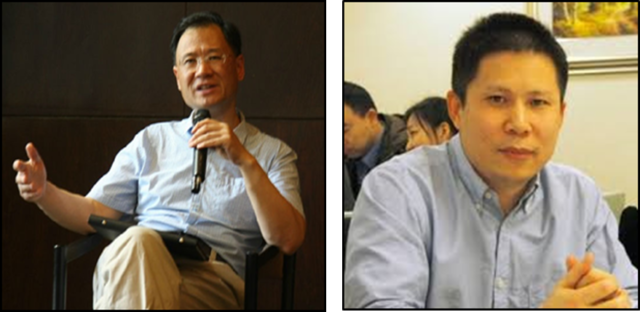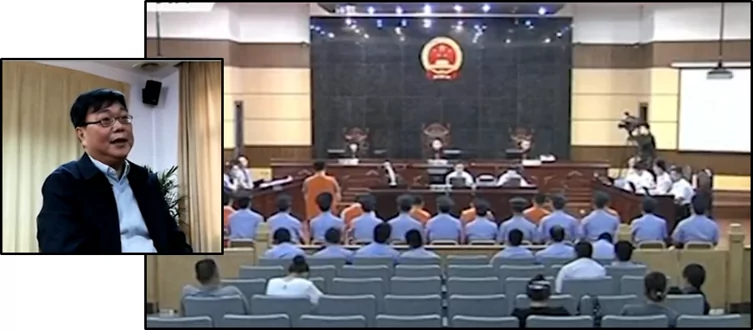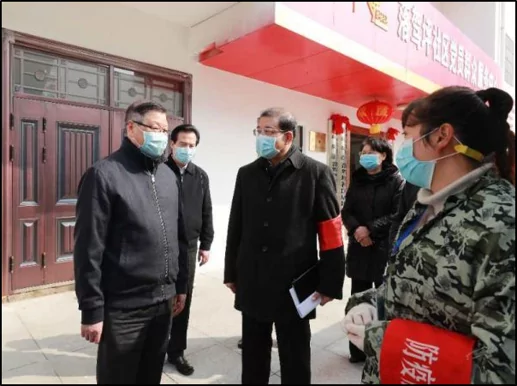
The Coronavirus Pandemic and the Rise of Chinese Civil Society
Publication: China Brief Volume: 20 Issue: 6
By:

Introduction: China’s Civil Society Amid the COVID-19 Pandemic
According to figures provided by People’s Republic of China (PRC) authorities, the COVID-19 pandemic peaked in early March. One day after Chinese Communist Party (CCP) General Secretary Xi Jinping made his only inspection tour of Wuhan on March 10, the epicenter of the outbreak, official statistics indicated that only eight new cases had appeared in the city—with only 15 new cases in China overall. Also per official figures, on February 25 more newly confirmed cases of COVID-19 originated from outside of China rather than inside the country (WHO, February 26). At least from one perspective, the authority and prestige of Xi seem to have been salvaged to some extent.
However, public intellectuals, journalists, whistleblowers and other members of civil society have insisted that if Xi had been forthcoming about the outbreak from day one—and if adequate medical facilities and equipment had been transported to Hubei Province in good time—the number of cases in China would have been significantly lower than 80,000 and that almost certainly, the number of fatalities would have been much less than the official figure of 3,199 as recorded on March 15 (Economic Times, March 15; Straits Times, March 12).
At a time when parts of China are under quasi-martial law, Xi has taken this opportunity to hit out at China’s nascent civil society. A large group of intellectuals risked their personal safety to eulogize the contribution of the late Wuhan doctor Li Wenliang (李文亮), who was one of the first whistle blowers to expose the severity of the coronavirus. On December 30, Li was among the first medical professionals to warn of a large virus outbreak; he subsequently fell victim to COVID-19 associated pneumonia and passed away on February 6 (Radio French International, February 20; BBC Chinese Service, February 7). Public intellectuals such as famed law professor Xu Zhangrun (许章润) of Tsinghua University and constitutional expert and activist human rights lawyer Xu Zhiyong (许志永) have disappeared (Chinese PEN, February 20; Radio Free Asia, February 19).
Meetings of institutions of civil society, such as both the legally recognized and the underground churches, have also been suppressed in the name of curtailing public gatherings (Christian Times (HK), March 20). The police state apparatus also took advantage of the quasi-curfew atmosphere to mete out a ten-year jail term to Hong Kong’s Causeway Bay bookseller Gui Minhai (桂敏海), who was first detained in Thailand in 2015 for publishing a rash of books deemed embarrassing to the CCP’s red aristocracy. While Gui has nothing to do with the pandemic, his heavy sentence seemed a warning to intellectuals who dare expose the party’s treatment of advocates of freedom of expression (HKEJ.com, February 25; Apple Daily, February 25).

Xi Jinping Uses the Crisis to Advance His Protégés
Pioneers in China’s nascent civil society have also zeroed in on the fact that Xi has taken advantage of the pandemic to raise the political fortunes of a host of officials who had worked with him in earlier years in Zhejiang and Fujian. (Xi was a mid- to senior-ranked official in Fujian from 1985 to 2002, and Party Secretary of Zhejiang from 2002 to 2007.) Several officials deemed protégés of Xi have been promoted during the fight against the pandemic. Foremost is the elevation of Shanghai mayor Ying Yong (应勇) to Hubei as Party Secretary. (The rank of party secretary is higher than that of governor or mayor.) Similarly, Wang Zhonglin (王忠林), the former party secretary of Jinan (capital of Shandong Province), has been moved to Wuhan as party secretary (China Brief, February 28). Although on the surface it was a lateral transfer, Wang Zhonglin in effect won a promotion given that Wuhan is a much higher-profile job.
Also having their political fortunes augmented are two senior cadres on the frontline of handling the pandemic in Wuhan: Xi-affiliated Vice-Premier Sun Chunlan (孙春兰) and Secretary-General of the Central Political-Legal Commission Chen Yixin (陈一新). Sun is the head of the Central Instruction Group (中央指導組長, Zhongyang Zhidao Zuzhang) for dealing with the pandemic in Hubei, and Chen is her deputy. A number of cadres close to Xi who are from coastal and central provinces, and who have been tasked with the temporary assignment of helping Hubei, are also seen as rising stars (Ming Pao, March 13; Apple Daily, March 7; HK01, February 22).
A number of intellectuals and “citizen journalists” have also faulted the way in which top officials such as Xi and Vice-Premier Sun sought to gain political capital during their tour of Wuhan. It was not until March 10, when the pandemic situation in Wuhan had stabilized, that Xi made an inspection trip to the city. Much was made of the fact that the authorities had deployed thousands of both People’s Armed Police and municipal police to “protect” Xi, who always remained at an extra safe distance from the medical workers and ordinary Wuhan residents whom he was supposed to encourage and cheer up (Apple Daily, March 14; Radio Free Asia, March 10). The voices of civil society were most strongly felt when Sun visited the Qingshan District of Wuhan on March 5. While Sun kept a safe distance from the ordinary residents, a few dozen who lived in the taller floors of the residential district shouted “Fake, fake! Everything is fake!” This was in apparent reference to pledges made by the Sun team that food and essential supplies would be made available to every family in the quarantined city (BBC Chinese Service, March 6; Radio Free Asia, March 5).

Civil Society Actors Make Their Voices Heard
On the surface, Chinese civil society actors—led by intellectuals, rights lawyers, and underground churchgoers—are being suppressed by draconian means. Yet, a number of brave activists have defied the censorship and oppression to have their voices heard. Tsinghua University professor Xu Zhangrun and a dozen-odd public intellectuals published a net-based appeal stating that “Freedom of expression starts today.” Apart from demanding proper treatment of victims of the pandemic, the petitioners asked for the establishment of a Dr. Li Wenliang Day, and a National Freedom of Expression Day. In an article titled “An Angry People Are No Longer Afraid,” Professor Xu took President Xi to task for gaining publicity for himself by using his tight control of the fight against the nation-wide pandemic. “He has no shame because his words and what is in his heart do not match,” wrote Xu (HKCNEWS, February 20).
A founder of the influential New Citizen Movement, constitutional expert Xu Zhiyong (no relation to Xu Zhangrun) simply asked for Xi to “step aside.” Before his disappearance on February 15, Xu wrote in an article critical of the leadership: “In their hearts, there are no concepts of right and wrong, no conscience, no bottom line and no human nature” (VOA Chinese Service, March 8; Radio French International, February 23). Famed rights lawyer Wang Yu (王宇) told the foreign media that “an authoritarian regime is propped up by two things: laws and violence.” She further stated that “the sudden death of Li Wenliang has made many people understand that this regime fears people who say the truth,” and “not only has the pandemic been covered up, even the death of Li Wenliang was not transparent” (Apple Daily, March 6; DW, February 13).
The most merciless attack on Xi came from the pen of Ren Zhiqiang (任志强), the well-known former CEO of a large corporation who is also a Communist Party member. In a February 23 article widely believed to be written by the popular internet commentator, Ren called an unnamed top official “a clown who insists on remaining an emperor despite the fact that his clothes have all been removed.” Ren has not been heard of since March 12, despite his many friends trying to locate his whereabouts. The article had a wide circulation in social media before being abruptly removed. It pointed out that the upper echelon of the CCP was faced with a “crisis of governance,” and that the media censorship delayed the saving of COVID-19 victims when the pandemic first broke in December (SCMP, March 15; Reuters, March 15; Radio French International, March 11).
Why has what some intellectuals call the “emancipation of the civil society” struck such a level of resonance among the people? As Tsinghua’s Professor Xu pointed out, everybody is equal before the pandemic. More significant is the realization that hiding the facts will only render the outbreak more deadly both in China and abroad. Some Chinese netizens have worn masks with the words “freedom of expression” (言論自由, yanlun ziyou) written on them, and taken photos posted on websites in China, Hong Kong and abroad (The Initium, February 25; Apple Daily, February 7).
Conclusion
Every time that the party-state has made blunders provides an opportunity for an emancipation of thought among civil society elements such as intellectuals and rights lawyers. Remember the Wenchuan earthquake of 2008 in Sichuan Province? Official statistics indicated that 69,227 died, with another 17,923 disappeared; yet unofficial estimates went as high as 300,000 lives lost. Moreover, the authorities never addressed the hundreds of shabbily built structures called “tofu buildings” (BBC Chinese, May 10, 2018; New York Times Chinese Edition, May 10, 2018). Not for nothing was 2008 called the “Inaugural Year of the Civil Society” (BBC Chinese Service, May 7, 2018; China.com.cn, May 20, 2008). This was when public intellectuals such as Ai Weiwei and Tan Zuoren risked being beaten by police in their investigations behind the shoddy tofu structures. Others lost their jobs and freedoms trying to compile a full list of primary and secondary students who perished in the tragedy. Volunteer contributions to the victims of the Wenchuan Earthquake totaled an estimated 60 billion yuan (Radio French International, May 12, 2018; The Initium, May 12, 2018).
In the course of the Wuhan pandemic, hundreds of whistleblowers and other civil society pioneers have suffered brutal treatment at the hands of the police-state apparatus. Apart from imposing draconian censorship measures, the authorities have detained hundreds of medical professionals, freelance journalists, and “citizen reporters” for telling the truth to overseas-based Chinese and foreign websites and social media platforms. Despite this, their voices have not been silenced, and their sacrifice and bravery attest to the continued and rising development of China’s stunted civil society.
Dr. Willy Wo-Lap Lam is a Senior Fellow at The Jamestown Foundation and a regular contributor to China Brief. He is an Adjunct Professor at the Center for China Studies, the History Department, and the Master’s Program in Global Political Economy at the Chinese University of Hong Kong. He is the author of five books on China, including Chinese Politics in the Era of Xi Jinping (2015). His latest book, The Fight for China’s Future, was released by Routledge Publishing in July 2019.




